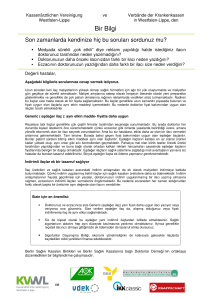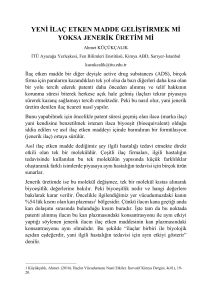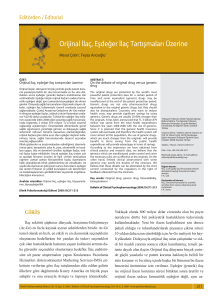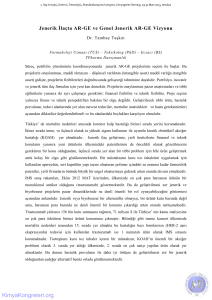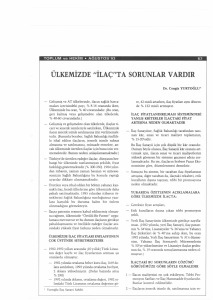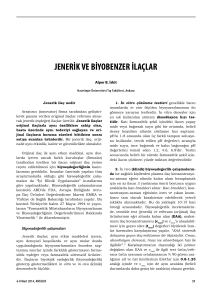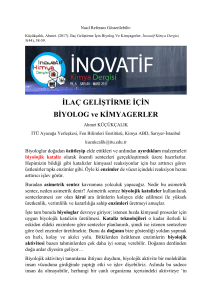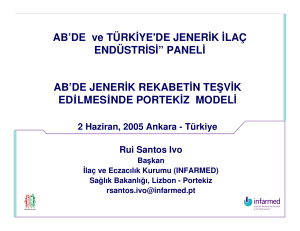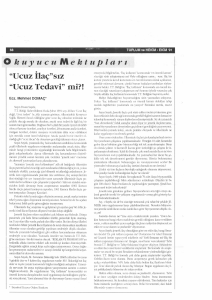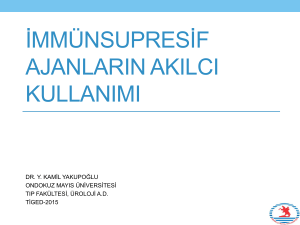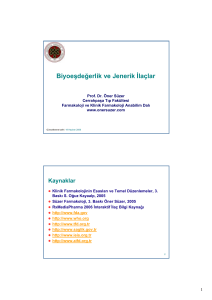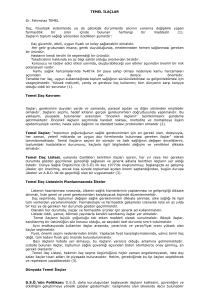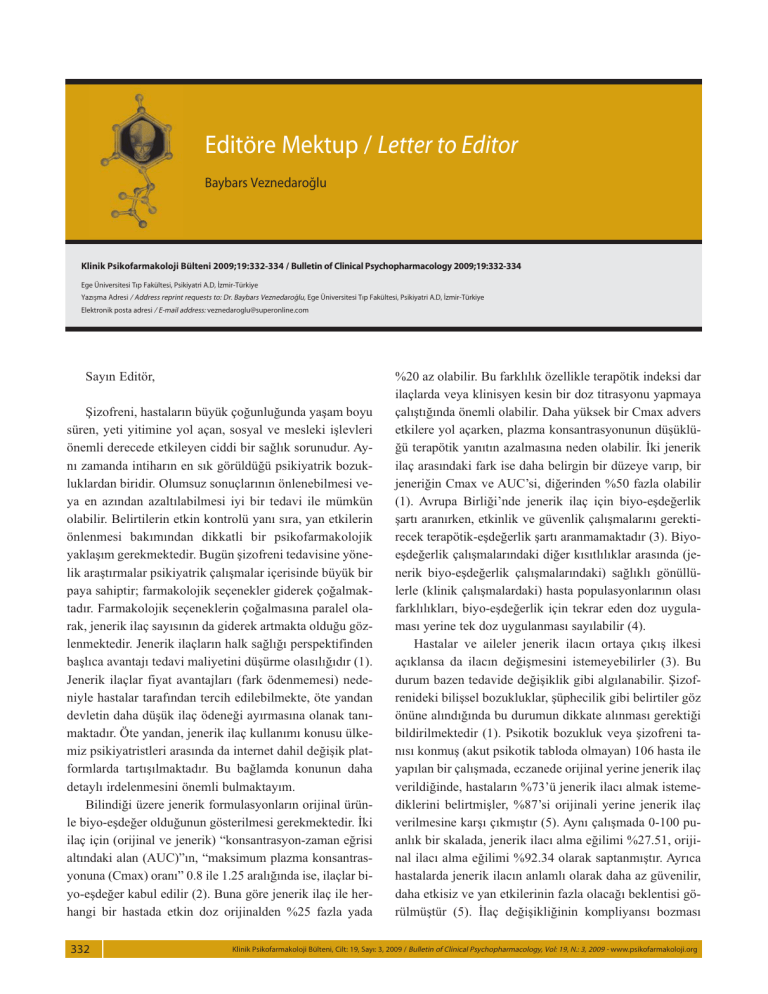
Editöre Mektup / Letter to Editor
Baybars Veznedaro¤lu
Klinik Psikofarmakoloji Bülteni 2009;19:332-334 / Bulletin of Clinical Psychopharmacology 2009;19:332-334
Ege Üniversitesi T›p Fakültesi, Psikiyatri A.D, ‹zmir-Türkiye
Yaz›flma Adresi / Address reprint requests to: Dr. Baybars Veznedaro¤lu, Ege Üniversitesi T›p Fakültesi, Psikiyatri A.D, ‹zmir-Türkiye
Elektronik posta adresi / E-mail address: [email protected]
Sayın Editör,
Şizofreni, hastaların büyük çoğunluğunda yaşam boyu
süren, yeti yitimine yol açan, sosyal ve mesleki işlevleri
önemli derecede etkileyen ciddi bir sağlık sorunudur. Aynı zamanda intiharın en sık görüldüğü psikiyatrik bozukluklardan biridir. Olumsuz sonuçlarının önlenebilmesi veya en azından azaltılabilmesi iyi bir tedavi ile mümkün
olabilir. Belirtilerin etkin kontrolü yanı sıra, yan etkilerin
önlenmesi bakımından dikkatli bir psikofarmakolojik
yaklaşım gerekmektedir. Bugün şizofreni tedavisine yönelik araştırmalar psikiyatrik çalışmalar içerisinde büyük bir
paya sahiptir; farmakolojik seçenekler giderek çoğalmaktadır. Farmakolojik seçeneklerin çoğalmasına paralel olarak, jenerik ilaç sayısının da giderek artmakta olduğu gözlenmektedir. Jenerik ilaçların halk sağlığı perspektifinden
başlıca avantajı tedavi maliyetini düşürme olasılığıdır (1).
Jenerik ilaçlar fiyat avantajları (fark ödenmemesi) nedeniyle hastalar tarafından tercih edilebilmekte, öte yandan
devletin daha düşük ilaç ödeneği ayırmasına olanak tanımaktadır. Öte yandan, jenerik ilaç kullanımı konusu ülkemiz psikiyatristleri arasında da internet dahil değişik platformlarda tartışılmaktadır. Bu bağlamda konunun daha
detaylı irdelenmesini önemli bulmaktayım.
Bilindiği üzere jenerik formulasyonların orijinal ürünle biyo-eşdeğer olduğunun gösterilmesi gerekmektedir. İki
ilaç için (orijinal ve jenerik) “konsantrasyon-zaman eğrisi
altındaki alan (AUC)”ın, “maksimum plazma konsantrasyonuna (Cmax) oranı” 0.8 ile 1.25 aralığında ise, ilaçlar biyo-eşdeğer kabul edilir (2). Buna göre jenerik ilaç ile herhangi bir hastada etkin doz orijinalden %25 fazla yada
332
%20 az olabilir. Bu farklılık özellikle terapötik indeksi dar
ilaçlarda veya klinisyen kesin bir doz titrasyonu yapmaya
çalıştığında önemli olabilir. Daha yüksek bir Cmax advers
etkilere yol açarken, plazma konsantrasyonunun düşüklüğü terapötik yanıtın azalmasına neden olabilir. İki jenerik
ilaç arasındaki fark ise daha belirgin bir düzeye varıp, bir
jeneriğin Cmax ve AUC’si, diğerinden %50 fazla olabilir
(1). Avrupa Birliği’nde jenerik ilaç için biyo-eşdeğerlik
şartı aranırken, etkinlik ve güvenlik çalışmalarını gerektirecek terapötik-eşdeğerlik şartı aranmamaktadır (3). Biyoeşdeğerlik çalışmalarındaki diğer kısıtlılıklar arasında (jenerik biyo-eşdeğerlik çalışmalarındaki) sağlıklı gönüllülerle (klinik çalışmalardaki) hasta populasyonlarının olası
farklılıkları, biyo-eşdeğerlik için tekrar eden doz uygulaması yerine tek doz uygulanması sayılabilir (4).
Hastalar ve aileler jenerik ilacın ortaya çıkış ilkesi
açıklansa da ilacın değişmesini istemeyebilirler (3). Bu
durum bazen tedavide değişiklik gibi algılanabilir. Şizofrenideki bilişsel bozukluklar, şüphecilik gibi belirtiler göz
önüne alındığında bu durumun dikkate alınması gerektiği
bildirilmektedir (1). Psikotik bozukluk veya şizofreni tanısı konmuş (akut psikotik tabloda olmayan) 106 hasta ile
yapılan bir çalışmada, eczanede orijinal yerine jenerik ilaç
verildiğinde, hastaların %73’ü jenerik ilacı almak istemediklerini belirtmişler, %87’si orijinali yerine jenerik ilaç
verilmesine karşı çıkmıştır (5). Aynı çalışmada 0-100 puanlık bir skalada, jenerik ilacı alma eğilimi %27.51, orijinal ilacı alma eğilimi %92.34 olarak saptanmıştır. Ayrıca
hastalarda jenerik ilacın anlamlı olarak daha az güvenilir,
daha etkisiz ve yan etkilerinin fazla olacağı beklentisi görülmüştür (5). İlaç değişikliğinin kompliyansı bozması
Klinik Psikofarmakoloji Bülteni, Cilt: 19, Say›: 3, 2009 / Bulletin of Clinical Psychopharmacology, Vol: 19, N.: 3, 2009 - www.psikofarmakoloji.org
B. Veznedaro¤lu
durumunda ortaya çıkabilecek hastaneye yatış, tedavi maliyetini arttıracaktır (6, 7). Şizofreninin maliyetini gözden
geçiren uluslararası bir makalede, şizofrenide doğrudan
yapılan sağlık harcamalarının ortalama %9.3’ünü ilaç harcamaları oluştururken, %60.4’ünün hastaneye yatışlardan
kaynaklandığı belirtilmektedir (7).
Antipsikotik ilaçlardan orijinal-jenerik karşılaştırılması en çok yapılan klozapin olmuştur. Klozapinle jenerik
klozapin arasında farmakokinetik farklılıklar olduğunu ve
klozapinden jenerik klozapine geçiş sonrası relaps görüldüğünü bildiren çalışmalar olduğu gibi (8,9), geçişin sorunsuz olduğunu belirten çalışmalar da mevcuttur (10,
11). Yine Hollanda’da yapılan bir çalışmada, jenerik oral
risperidon solüsyonun orijinal tablet ile biyo-eşdeğer bulunmadığı bildirilmiştir (12). Almanya’da yapılan yeni bir
çalışmada ise, jenerik risperidona geçiş sonrasında kompliyansta %5.2 veya üzerinde bir bozulma durumunda, tedavi maliyetin orijinal risperidon ile tedaviye göre daha
pahalı olacağı belirtilmiştir (13).
Bizim de deneyimlerimiz jenerik ilaç kullanımında zaman zaman sorunlar yaşanabildiği veya orijinal ilaçtan jeneriğe geçiş sırasında akut alevlenme ile karşılaşılabildiği
şeklindedir. Bu durumlarla tarafımızca jenerik ilaçta doz
artımına gidilmesi veya orijinal ilaca geri dönülmesi ile
baş edilmeye çalışılmıştır. Ancak akut alevlenme yaşayan
olgularda hastanın eski durumuna dönmesi zaman alabilmekte, ayrıca bu dönemde ciddi sorunlar yaşanabilmektedir. Öte yandan, yineleyen epizodların şizofrenide kronikleşmeye yol açabileceği akılda tutulmalıdır. Bu bağlamda,
şizofrenide orijinalden jeneriğe, bir jenerikten diğerine ve
jenerikten orijinal ilaca geçişin sonuçlarına ilişkin daha
detaylı araştırmalara gereksinim olduğu belirtilmekte, halihazırda jenerik ilaca geçişin büyük bir dikkat ve düzenli
izlemle yapılması önerilmektedir (1).
Dear Editor,
Schizophrenia, which is a lifelong illness, causing loss
of skills, and affecting social and professional functions in
most of the patients, is a serious health problem. It is also
one of the psychiatric illnesses in which suicide is more
prevalent. It is possible to prevent or at least decrease the
negative consequences of this disorder with effective
treatment. A careful psychopharmacological approach is
required for an effective control of symptoms, as well as
avoidance of treatment side effects. Currently,
investigations on schizophrenia occupy an important
place in all psychiatric studies, and pharmacological
options are steadily increasing. In parallel with this
increase in pharmacological options, an increase in the
number of generic medications is observed. The main
advantage of generic medications from the point of public
health view is the possibility of a decrease in treatment
costs (1). Generic medications may be preferred by
patients because of their cost advantages (patients do not
have to pay more), and this advantage creates an
opportunity for the government to pay less for medication
costs. Use of generic medications is a cause of debate
among psychiatrists in several different mediums
(including internet) in Turkey, and in my opinion a
detailed analysis of this topic is very important.
As commonly known, bio-equivalence of generic
formulations with original brands is required. Two
medications (brand and generic) may be considered bioequivalent if the ratio of “area under concentration – time
curve (AUC)” to maximal plasma concentration (Cmax) is
between 0.8 - 1.25 (2). The effective dose in a patient may be
25% more or 20% less with the generic formulation
compared with the original. This difference may be
important especially in medications with a narrow
therapeutic index and in conditions where the clinician
intends a strict dose titration. A higher Cmax may cause
adverse effects, while a lower plasma concentration may
cause a decrease in therapeutic response. The difference
between two generic medications may be even more
prominent, with the Cmax and AUC of one 50% greater than
the other (1). While bio – equivalence is required for generic
medications in the European Community, therapeutic
equivalence requiring efficacy and safety studies are not
mandatory (3). Possible differences between healthy
individuals (in generic bio – equivalence studies) and patient
populations (in clinical studies), use of single dose instead of
repeated doses for bio – equivalence may be mentioned as
other limitations of bio – equivalence studies (4).
Patients and their families may not accept a change in
their medications, even if they are informed about the
rationale of generic medications (3). Shifting from a
brand to a generic may be felt as a change in treatment
and in view of the cognitive functional disorders and
symptoms of suspicion in schizophrenia; such a
medication shift should be carefully considered (1). In a
Klinik Psikofarmakoloji Bülteni, Cilt: 19, Say›: 3, 2009 / Bulletin of Clinical Psychopharmacology, Vol: 19, N.: 3, 2009 - www.psikofarmakoloji.org
333
fiizofreni tedavisinde kullan›lan orijinal ve jenerik ilaçlar
study of 106 patients with diagnosis of a psychotic
disorder or schizophrenia (not in acute psychotic
exacerbation phase), 73% of the patients reported that
they did not want generic instead of brand medications
when given generic medications instead of the original
ones at the pharmacy, and 87% did not accept generic
medications instead of the original ones (5). In the same
study, preference for generic medications were found
27.51%, whereas the preference for original medications
were 92.34%, using a scale of 0 – 100 points. Also, an
impression among the patients was detected, that generic
medications are less reliable and less effective, and cause
more side effects (5). Hospitalizations due to nonadherence created by changes in medications may
increase the cost of treatment (6,7). In an international
paper on the cost of schizophrenia, only 9.3% of the total
direct health costs were due to medication bills, whereas
60.4% were the costs of hospitalizations. (7).
Among anti-psychotic drugs, the medication in which
most extensive original – generic comparisons were made
is clozapine. There are studies both stating the existence
of pharmacokinetic differences between generic and
original clozapine and reporting relapses among patients
after switching from original to generic clozapine (8,9),
whereas other studies report an uneventful switch from
original to generic clozapine (10,11). In a study
conducted in Holland, it was reported that generic oral
risperidone solution is not bio – equivalent with the
original tablets (12). In another study from Germany, it
was reported that deterioration in adherence of 5.2% and
more after a switch to generic risperidone, the cost of
treatment was more expensive than the cost of treatment
with original risperidone (13).
Our experience is also in accordance with the belief that
occasional problems may arise in generic medication use
and acute exacerbations may be seen during medication
switch from original to generic formulations. We try to deal
with such situations by increasing the dose of the generic
drug or returning back to the originalmedication. A return
to the former clinical condition of the patient after an acute
exacerbation may take time and serious problems may be
seen during these periods. It should be kept in mind that
recurrent episodes may lead chronic changes to become
permanent in schizophrenia. The need for further
investigations on the consequences of medication changes
from original to generic, from one generic to another
generic, and from generic to original medications is
commonly expressed, and medication changes to generic
formulations is advised to be done with caution, and under
close regular observations (1).
Kaynaklar:
1.
Nuss P, Taylor D, De Hert M, Hummer M. The generic alternative
in schizophrenia: opportunity or threat? CNS Drugs. 2004;18:769775
8.
2.
World Health Organization. Multi-source pharmaceutical products:
WHO guideline on registration requirements to establish
interchangeability. Geneva: WHO, 1996. WHO Technical Support
Series no. 863
9.
3.
Borgherini G. The Bioequivalence and Therapeutic Efficacy of
Generic Versus Brand-Name Psychoactive Drugs. Clin Ther.
2003;25: 1578-1592
Lam YW, Ereshefsky L, Toney GB, Gonzales C. Branded versus
generic
clozapine:
bioavailability
comparison
and
interchangeability issues. J Clin Psychiatry. 2001;62 Suppl 5: S18S22
Kluznik JC, Walbek NH, Farnsworth MG, Melstrom K. Clinical
effects of a randomized switch of patients from clozaril to generic
clozapine. J Clin Psychiatry 2001; 62 Suppl 5: S14-S17
10. Paton C. Generic clozapine: outcomes after switching formulations.
Br J Psychiatry. 2006;189:184-185
4.
Meredith P. Bioequivalence and other unresolved issues in generic
drug substitution. Clin Ther 2003; 25: 2875-2890
11. Alessi-Severini S, Honcharik PL, Simpson KD, Eleff MK, Collins
DM. Evaluation of an interchangeability switch in patients treated
with clozapine: A retrospective review. J Clin Psychiatry.
2006;67:1047-1054
5.
Roman B. Patients' attitudes towards generic substitution of oral
atypical antipsychotics: a questionnaire-based survey in a
hypothetical pharmacy setting. CNS Drugs. 2009;23:693-701
12. van Os S, Relleke M, Piniella PM. Lack of bioequivalence between
generic risperidone oral solution and originator risperidone tablets.
Int J Clin Pharmacol Ther. 2007;45:293-299
6.
Thieda P, Beard S, Richter A, et al. An economic review of
compliance with medication therapy in the treatment of
schizophrenia. Psychiatr Serv 2003; 54: 508-16
13. Treur M, Heeg B, Möller HJ, Schmeding A, van Hout B. A
pharmaco-economic analysis of patients with schizophrenia
switching to generic risperidone involving a possible compliance
loss. BMC Health Serv Res. 2009, 9:32doi:10.1186/1472-6963-9-32
7.
Knapp M, Mangalore R, Simon J: The global costs of schizophrenia.
Schizophr Bull 2004, 30:279-293
334
Klinik Psikofarmakoloji Bülteni, Cilt: 19, Say›: 3, 2009 / Bulletin of Clinical Psychopharmacology, Vol: 19, N.: 3, 2009 - www.psikofarmakoloji.org

